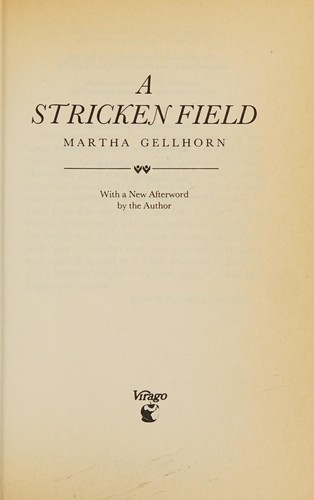Martha Gellhorn was born in St. Louis, Missouri, the daughter of a suffragette and a gynecologist. In 1926 she graduated from John Burroughs School and then attended Bryn Mawr College in Philadelphia. In 1927, she left before graduating to pursue a career as a journalist. In 1930 she went to France for two years where she worked as a foreign correspondent for the United Press. While in Europe, she became active in the pacifist movement, which she wrote about in her first book, What Mad Pursuit (1934). Upon returning to the U.S., she worked as an investigator for the Federal Emergency Relief Administration, reporting on the impact of the Depression on the United States. Her reports caught the attention of Eleanor Roosevelt, and the two women became lifelong friends. In 1936, on a trip to Key West, she met the author Ernest Hemingway. They travelled together in Spain, where she was reporting on the Spanish Civil War for Collier's Weekly. Later, she reported on the rise of Adolf Hitler in Germany and in 1938 she was working in Czechoslovakia. She later reported the war from Finland, Hong Kong, Burma, Singapore and Britain. She was among the first journalists to report …
Martha Gellhorn
Author details
- Born:
- Nov. 8, 1908
- Died:
- Feb. 15, 1998
External links
Martha Gellhorn was born in St. Louis, Missouri, the daughter of a suffragette and a gynecologist. In 1926 she graduated from John Burroughs School and then attended Bryn Mawr College in Philadelphia. In 1927, she left before graduating to pursue a career as a journalist. In 1930 she went to France for two years where she worked as a foreign correspondent for the United Press. While in Europe, she became active in the pacifist movement, which she wrote about in her first book, What Mad Pursuit (1934). Upon returning to the U.S., she worked as an investigator for the Federal Emergency Relief Administration, reporting on the impact of the Depression on the United States. Her reports caught the attention of Eleanor Roosevelt, and the two women became lifelong friends. In 1936, on a trip to Key West, she met the author Ernest Hemingway. They travelled together in Spain, where she was reporting on the Spanish Civil War for Collier's Weekly. Later, she reported on the rise of Adolf Hitler in Germany and in 1938 she was working in Czechoslovakia. She later reported the war from Finland, Hong Kong, Burma, Singapore and Britain. She was among the first journalists to report from Dachau concentration camp after it was liberated.
She married Hemingway in 1940, but her career as a journalist kept travelling for long periods of time, and they divorced in 1945. After the war, she covered the Vietnam War, the Six-Day War in the Middle East, and the civil wars in Central America for the Atlantic Monthly. In 1949, she adopted a son from an Italian orphanage, and although she was briefly a devoted mother, she soon left him to the care of her relatives in Englewood, and he eventually ended up in boarding school. She married Tom Matthews, editor-in-chief of Time magazine, in 1954; they were divorced in 1963.
Aged 81, she travelled impromptu to Panama, where she wrote on the U.S. invasion. Only when the Bosnian war broke out in the 1990s did she concede she was too old to continue her career as a war correspondent. She died in London in 1998, aged 89, taking her own life after a long battle with cancer and near total blindness. She is considered to be one of the greatest war correspondents of the 20th century.
Gellhorn published a large number of books, including a collection of articles on war, The Face of War (1959), a novel about McCarthyism, The Lowest Trees Have Tops (1967), an account of her travels (including one trip with Ernest Hemingway), Travels With Myself and Another (1978) and a collection of her peacetime journalism, The View From the Ground (1988). Her selected letters were published posthumously in 2006.
